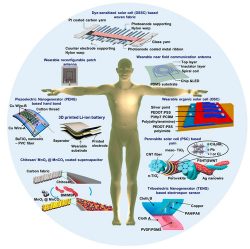
The Potential of Electrospinning to Enable the Realization of Energy-Autonomous Wearable Sensing Systems
The market for wearable electronic devices is experiencing significant growth and increasing potential for the future. Researchers worldwide are actively working to improve these devices, particularly in developing wearable electronics with balanced functionality and wearability for commercialization.
The number of IoT devices is on the rise, and this has led to a need for new ways to power these technologies. Wearable electronic devices can use various energy-harvesting technologies, such as mechanical, thermal, evaporative, and solar, to generate power for future energy needs. Electrospinning, a technology that creates nano/microfiber-based membranes with high surface area, porosity, and favourable mechanical properties for human in vitro and in vivo applications using a broad range of materials, is proving to be a promising approach for wearable applications. This publication provides a review which offers a comprehensive analysis of how electrospinning technology can be used in energy-autonomous wearable wireless sensing systems.
Read the full paper on ACS Nano, which was selected as an editorial choice at ACS Publications.
Authors: K. R. Sanjaya Dinuwan Gunawardhana, Roy B. V. B. Simorangkir, Garrett Brian McGuinness, M. Salauddin Rasel, Luz A. Magre Colorado, Sonal S. Baberwal, Tomás E. Ward, Brendan O’Flynn, and Shirley M. Coyle
ACS Editors’ Choice is a collection designed to feature scientific articles of broad public interest. ACS select, feature, and make openly available one article per day, free to read for a limited period of time. This is to highlight the newly published work of an author and research team.